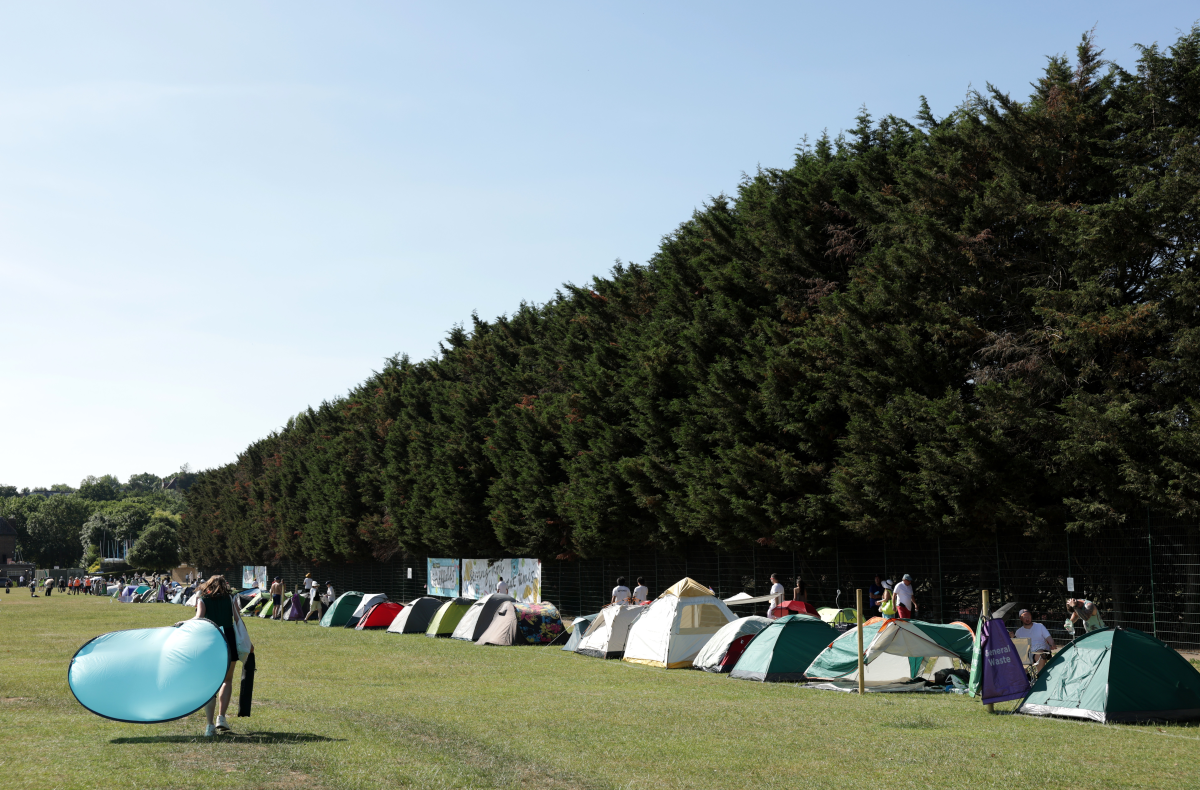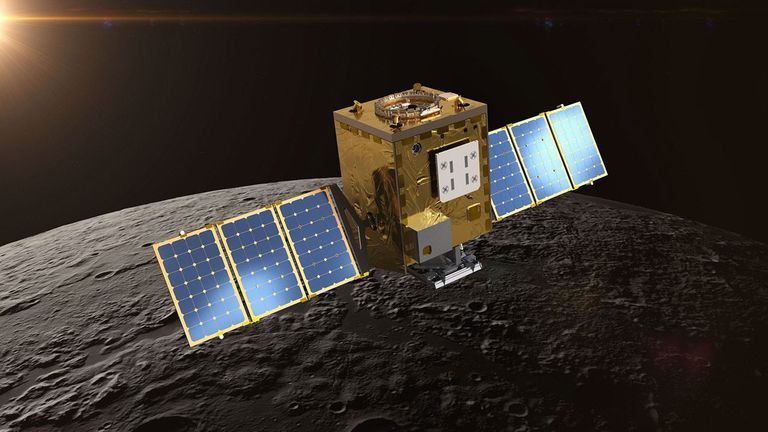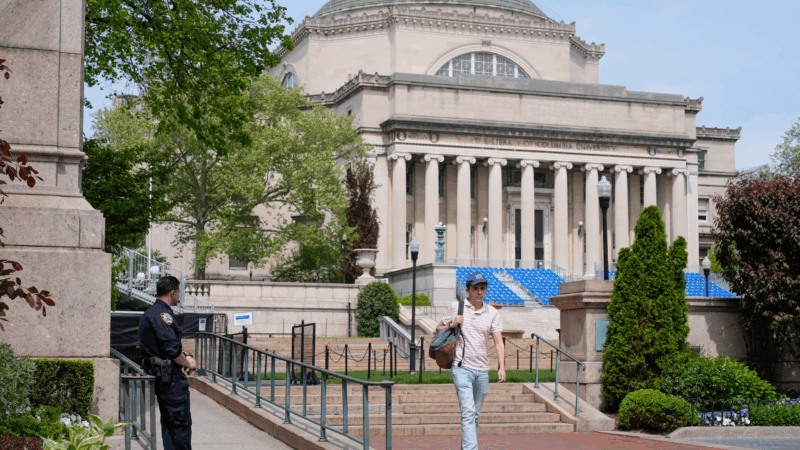Welcome to the Queue, where waiting for Wimbledon tickets rivals the tennis
LONDON — At the world’s most prestigious tennis tournament, hundreds of the best tickets are reserved for regular folks at low prices — if they’re willing to camp out for hours or days.
So every summer, the grounds of the All England Lawn Tennis and Croquet Club — better known as Wimbledon — fill with thousands of campers. Less than a quarter-mile from Centre Court, people line up in a grassy, sometimes muddy, field. They pitch tents and party while waiting in line for tickets to the Wimbledon Lawn Tennis Championships.
It’s called “the Queue.” It’s got its own social media accounts (@ViewFromTheQ on X, for example). And some say it’s more fun than the tennis itself.
There are tennis-themed singalongs, cocktail parties and mini tennis tournaments between rows of tents. People serve up the quintessential Wimbledon treat — strawberries and cream — to strangers in the Queue. When NPR visited this week, one ticket hopeful was dressed up as a 1980s John McEnroe, wearing short shorts and with a sweatband across his brow.
“The queue is vastly more important than the tournament. It’s where the spirit of the whole thing resides, not with the corporate crowd,” says Charles Elstub, from London, who brought his guitar to serenade others in line. “It’s here! This is Wimbledon.”

Tickets to watch the actual tennis cost anywhere from £20 ($27) for a grounds pass to tens of thousands of pounds (dollars) for premium packages. But 500 of the very best Centre Court seats are reserved on each day of the two-week tournament for campers to purchase, starting at £75 ($101). Hundreds more tickets are on sale for less than that, on other courts.
“This is the only Grand Slam in the world where a true tennis fan can be guaranteed of getting tickets for the Centre Court,” says James Mendelssohn, chief steward at the All England Club.
As they pour through the club gates, ticket hopefuls are handed Queue cards with a five-digit number. They’re corralled into long lines, pitch their tents, then download an app with a multi-page guide to British queuing etiquette.
Rule No. 1: Don’t leave your tent for longer than 30 minutes or it’ll get disassembled, tossed out and you’ll lose your spot in line. Stewards go around with a timer, checking.
“The odd person will try to slip in and say, ‘I’ve lost my Queue card’ or ‘My friend’s got it over there’ — and we’ve heard it all before,” Mendelssohn explains. “We’re very British, very polite, and we show them where the back of the Queue is.”

The back of the Queue is helpfully demarcated by a giant flagpole with a green flag bearing a single letter: Q. A steward moves it backward as the line gets longer.
Nobody can pitch a tent, then dash home or back to a hotel for a good night’s sleep. Even waiting too long for the public toilets could be risky. The rule is that campers must stay with their tents, in the Queue, for hours — sometimes days.
But nobody is left twiddling their thumbs either.
“We’ve taken trains, planes and automobiles to get here, and we’re so excited!” says Adele O’Connor, 60, who traveled from Dublin with her daughter.
“Everyone’s having a great time making friends, drinking wine — whether we get in or not!” says Anabel Sanders, 27, from London. She and her friends brought the bare essentials: “Picnic rug, wine, prosecco! With the British weather, we should probably have brought an umbrella. Fingers crossed it stays dry!” she says.
A family visiting from North Carolina was livestreaming ESPN footage from Centre Court via a VPN into their tent — while waiting in line for tickets to Centre Court.
As the sun sets over Wimbledon, swifts and swallows soar and dive overhead. Campers bed down for the night.
And far in the distance, whenever there’s a lull in the party, an occasional cheer can be heard from Centre Court, less than a quarter-mile away — where some of these lucky campers will be watching world-class tennis the next day.
Chicagoans pay respects to Jesse Jackson as cross-country memorial services begin
Memorial services for the Rev. Jesse Jackson Sr. to honor his long civil rights legacy begin in Chicago. Events will also take place in Washington, D.C., and South Carolina, where he was born and began his activism.
In reversal, Warner Bros. jilts Netflix for Paramount
Warner Bros. says Paramount's sweetened bid to buy the whole company is "superior" to an $83 billion deal it struck with Netflix for just its streaming services, studios, and intellectual property.
Trump’s ballroom project can continue for now, court says
A US District Judge denied a preservation group's effort to put a pause on construction
NASA lost a lunar spacecraft one day after launch. A new report details what went wrong
Why did a $72 million mission to study water on the moon fail so soon after launch? A new NASA report has the answer.
Columbia student detained by ICE is abruptly released after Mamdani meets with Trump
Hours after the student was taken into custody in her campus apartment, she was released, after New York City Mayor Zohran Mamdani expressed concerns about the arrest to President Trump.
These major issues have brought together Democrats and Republicans in states
Across the country, Republicans and Democrats have found bipartisan agreement on regulating artificial intelligence and data centers. But it's not just big tech aligning the two parties.






